Abstract
In our article we consider important and essential aspects of education. The present, but especially the future, shows us that education like the one used today is no longer enough. The sphere of innovation is very extensive; in our article we emphasize the novelty of the education content, as well as the methods and forms of pedagogical work. The purpose of the article is to encourage teachers to think deeply about the possibilities for improving education. Innovation in education is not only the current requirements of the present time it is a particularly important responsibility of teachers and educators for the future. During the discussion of education, the question sometimes arises: what is innovative? The answer to this is given in the article, but we can come up with a different answer. We could describe past studies as “learning with chalk, language and listening”. Of course, we do not need to describe and explain that the current and future of teaching are fundamentally different. It is characterized by such attributes as activity, collaboration, creativity, interactivity and many others. We must not forget information and communication technologies which also make an extremely important contribution to innovation in education. E.M. Rogers describes the teacher`s very beautiful and short innovation in his book “Difference of innovations”. Such teachers teach with interest. The essence and purpose of the work is “measured” and appreciated, which should not cause students’ stress and not interfere with study. They pay special attention to students’ motivation to study. This is accompanied by their desire to be inventive and creative. In this sense, we note that innovation does not always mean something exclusively new. Innovation also lies in the creativity and the teacher and students’ approach. A.G. Bermus also writes a lot in his book about innovation in education in several contexts – this is just a question of implementing these ideas into real education.
References
Бермус А. Г. Модернизация образования: философия, политика, культура : монография. Канон + РООИ «Реабилитация», 2011. 384 с.
Kohútová K. Subjektívne vnímaná profesijná zdatnosť učiteľa: reflexia výskumných zistení. Slovak : In Studia Scientifica Facultatis Paedagogicae. Ružomberok : Verbum, 2019. 172-184 p.
Okoń W. Nowy słownik pedagogiczny. Warszawa : Wydawnictwo Źak, 2001. 468 p.
Rogers E. M. Diffusion of Innovations. New York : FreePress. 5th edition, 2003. 551 p.

